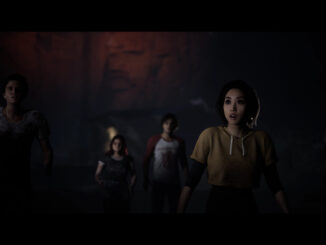Our review of Mass Effect: Legendary Edition, developed by BioWare. Available now for PS4 (reviewed), Xbox One, and Windows.
WARNING – THIS REVIEW CONTAINS MAJOR SPOILERS OF GALACTIC CONSEQUENCE.

WHAT IS IT?
The greatest video game trilogy ever made. Also, Canadian!
IS IT GOOD?
Yes.
WHO SHOULD PLAY IT?
As far as I’m concerned, it’s one of the Top 10 Essential Video Games.
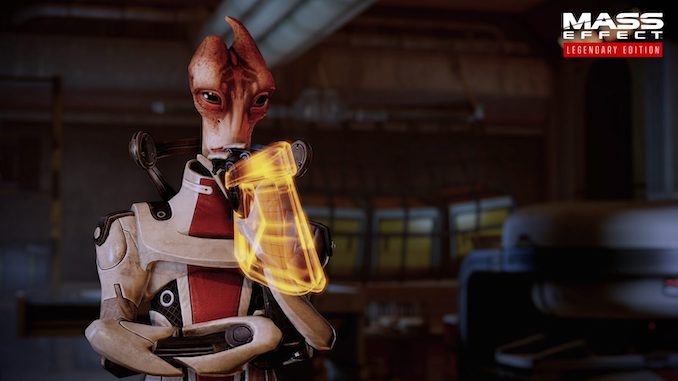
I AM THE VERY MODEL OF A SCIENTIST SALARIAN
I killed Mordin Solus.
Even after all these years, it still pains me to admit it.
Mordin – my crewmate, my friend of two games and countless DLC side-stories. The only salarian I’ve ever met with a penchant for Gilbert and Sullivan. And I’ve met many, many salarians over the years.
Mordin died because I refused to let him cure the genophage, a disease he created. The genophage was a nasty bit of bioengineering, a weapon that ended the galactic aspirations of the ruthless warrior race known as the krogan. Mordin’s bioweapon rendered most krogans sterile – within a few generations, they were on the verge of extinction. But by the time Mass Effect 3 rolled around, Mordin had seen the error of his ways, devoting all his efforts to finding a cure. Even if it meant that the restored krogans would again pose a serious threat to peace in the galaxy.
To be clear, I did not kill Mordin because I opposed the cure. I had krogan friends, and anyway I’m not going to be the guy who condoned space genocide. I killed Mordin because the moment demanded it: the Reapers, an intergalactic race of techno-organic monsters, were headed to Earth, and the salarian alliance had promised to aid the war effort. But the salarians, fearing a resurgent krogan, imposed one condition: deal with the krogan threat once and for all.
I shot my friend in the back.
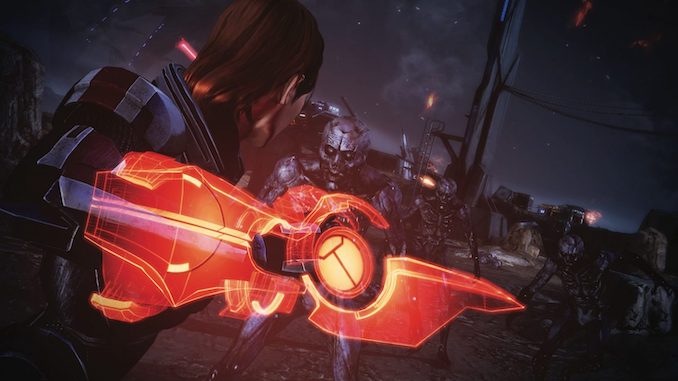
REMEMBER
There’s never been anything quite like Mass Effect. Not before, and nothing since. A grand space opera in the Star Wars or Star Trek vein, only one in which you play a central role. You decide which actions to take, which characters to trust, which alliances to make. You decide who to bring on any given mission. You decide who to flirt with or fall in love with.
And Mass Effect remembers. One of the things that’s so terrible about Mordin’s death in Mass Effect 3 is that it isn’t just any Mordin who dies, but rather your Mordin. The one who accompanied you across multiple games, your relationship moulded by the choices you’ve made, the conversations you’ve had.
Mass Effect was, and remains, the only video game series to successfully implement a carry-over save system: let Urdnot Wrex die in Mass Effect 1, and he won’t appear in subsequent games. Fail to prepare for the “Suicide Mission” in Mass Effect 2, and watch helpessly as anywhere from one to a half-dozen of your allies fall at the hands of the Collectors. The web of romantic entanglements is even more complicated. Romance Liara in ME1, then pick up with Tali in ME2 while Liara is out of the picture, only for Liara to resurface in ME3, jealously asking what you’ve been up to. (Yes, this happened to me.)
Fascinatingly, Mass Effect also remembers the little things: whether you were rude to a reporter that one time; your choice about how to deal with a corrupt shopkeeper. In ME1, there’s a goofy sub-subplot about a “superfan” named Conrad Verner, who really, really wants your autograph. Depending on how you handle him, you might (a) never see Verner again, (b) cross paths in ME2, and/or (c) witness, in ME3, a surprisingly satisfying resolution to his story.
Unlike so many other choice-based games (The Walking Dead, I’m looking at you), the game doesn’t telegraph this. It just quietly tracks your choices, only to surprise you with the consequences hours or even games later. And there are hundreds of choices like this, both big and small. Often, you won’t realize the repercussions of something you’ve done until long after it’s too late to try to change things.
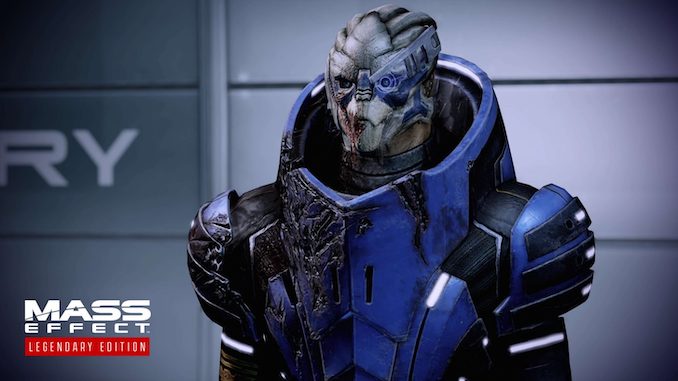
TO BOLDLY GO
When Mass Effect came out, I really, really wanted it to be a Star Trek game. Developer BioWare had already done Star Wars (in the fabled Knights of the Old Republic), but everything about Mass Effect screamed Star Trek, in particular, the latter seasons of Deep Space Nine:
There, as here, the action revolves around a crew saddled with the daunting task of saving the galaxy while navigating a complicated geo-spatial-political landscape. There, as here, an ancient alien race has its googly alien eyes set on galactic domination. There, as here, there’s a beloved cast of central characters supported by a diverse and interesting group of supporting characters. There, as here, we find moments of levity among the darkness.
But after five years with the original Mass Effect trilogy, and now revisiting it a decade later, I’m grateful it stands on its own. Not beholden to any particular IP, BioWare’s designers were free to craft a galaxy entirely of their own making. Every detail in Mass Effect has been thought out; every alien race brilliantly designed and given a fleshed-out, nuanced backstory. Amusingly, much of the alien design still comes from the human-with-prosthetics school – apparently nobody told BioWare that no such constraints apply to a virtual environment – but there’s something charming about the way the whole endeavour comes across as alt-Star Trek.
Like the best space operas, Mass Effect is as much a story about a galaxy-spanning threat as it is about one group of friends/shipmates. One of the many things I love about Mass Effect is that characters’ personalities are defined by, well, their personalities – and not by their particular species. Superficially, some, like the militant krogan mentioned above, may seem to fall into standard sci-fi tropes. But Mass Effect is at pains to show you the civilian krogan, the krogan parent, the krogan child. In this respect, Mass Effect often out-Treks Trek: it’s a rare character who comes across as mere caricature.
At the macro level, the high stakes of the storyline – there is a Very Big Bad on its way, and you have three games to prepare – are reflected in the equally high stakes of the game’s complex consequence-tree. Wrex’s death, if it happens, has repercussions that spread beyond the first game, notably in how other krogans react to you. Later, as you meet new characters – say, Jack, in Mass Effect 2 – they will arrive with preconceived notions about you, based on your earlier actions. Of course, your reputation can and does evolve, and it’s interesting to see how it affects Jack, and so many others, as the series progresses.
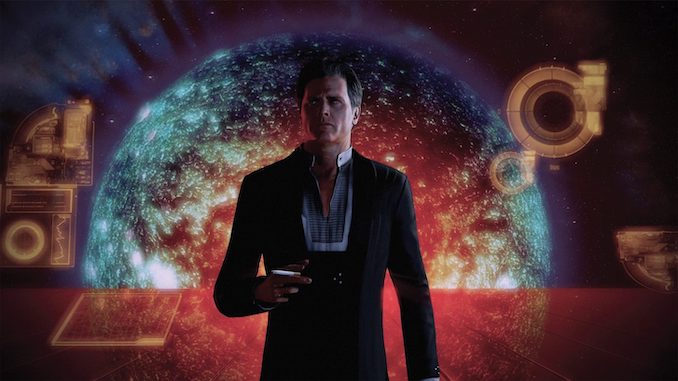
SUICIDE MISSION
Mass Effect is a complete work. By which I mean: much like Lord of the Rings (or Wagner’s Der Ring des Nibelungen, for that matter), it needs to be approached as a complete cycle. Mass Effect 1 establishes the universe, the stakes. Mass Effect 2 ups those stakes, while expanding the universe in meaningful and interesting ways. Mass Effect 3 is the culmination: an emotional, rewarding climax to a story unlike any seen in the medium.
ME1 is undoubtedly the weakest in the series, though it’s still a remarkable accomplishment. The galaxy arrives fully formed, with a rich history that is doled out not in exposition dumps, but in the natural flow of conversation, in the subtle details found in the environments. Wisely, the Mass Effect protagonist is a blank slate – you not only design his/her face (which carries over between games), but you also pick from a menu of backstories and psychological profiles, which together affect things like how characters respond to you, or what dialogue options you can choose from. ME1 also introduces some of sci-fi’s greatest characters, including Garrus Vakarian (the galaxy’s #1 dreamboat) and the brilliant and beautiful Liara T’Soni and Tali’Zorah vas Rayya (my two aforementioned paramours).
Popular consensus suggests that ME2 is the best of the series. While certainly an improvement over its predecessor, it also has weird pacing issues. Specifically, its climactic Suicide Mission is available almost from the start, yet the game pushes you into a set of quasi-optional Loyalty missions beforehand. These ten missions are at best tangential to the overarching threat, yet you slog through them because the game warns, with a broad wink, that it’s the best way to ensure your crew survives. It winds up making this expansive game feel rather small, almost like a recruitment drive: Chapter 1: Recruit The Team, Chapter 2: Team Loyalty, Chapter 3: Suicide Mission. That said, ME2‘s emphasis on the personal – accompany brooding biotic Jack as she confronts her dark past, accompany assassin Thane as he reconciles with his son, etc. – means that it’s home to many of the best character moments.
The controversy surrounding ME3 has, even all these years later, hardly abated. On the one hand, the game absolutely delivers on the promise of its predecessors, wrapping up its many main threads while also taking time to revisit stories, characters, and choices from earlier games in ways that are usually rewarding, and often surprising. (Case in point: the return of Conrad Verner, if he made it this far.) On the other hand, ME3 squanders its ending, offering in its final moments a simplistic colour-coded menu of choices that largely renders all previous decisions moot. (The backlash was so bad, somebody mailed four hundred colour-coded cupcakes to BioWare, which, to be fair, is hilarious.) Still, ME3 will always be my favourite in the series, because, in moments both big and small, it reminds me of everything that came before. All the decisions I made, all the friends I gained and lost.
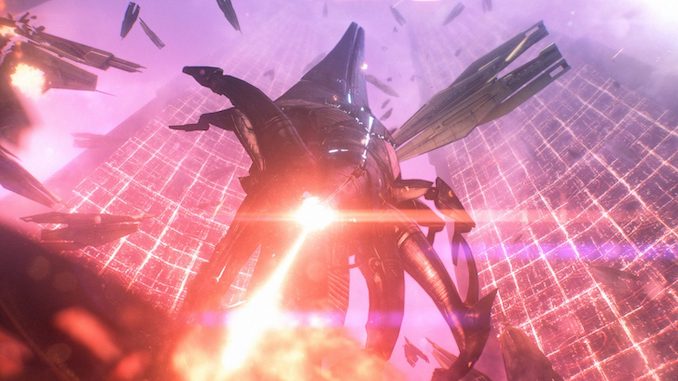
PRIORITY: EARTH
For all its flaws, Mass Effect may very well be the epitome of what video games can accomplish. It looks, sounds, and feels like a classic space opera, except that instead of Captain Kirk or Luke Skywalker, the main character is you. Or, at least, an approximation of you: a blank-slate protagonist whose personality is defined in part by a complicated programming algorithm, but mostly by the decisions you make, the things you choose to say (or not say).
My Commander Shepard, the one who I carried through all three games and across a single save file, was a dangerous kind of pragmatist: seeking the best option for the circumstances, but ruthless when necessary. Mordin Solus died because I killed him, because I decided that’s what was best for the war effort, and because I decided I had the right to make that kind of decision. That is, perhaps, a damning indictment of me, the player, but it’s also a testament to Mass Effect‘s ability to totally involve me in its universe.
For decades, I wondered what it would be like to put on a Starfleet uniform, to embark upon a grand sci-fi adventure. But I hadn’t accounted for having to make the tough choices of a space commander as well. Mass Effect gave me that opportunity, and it will stay with me forever.
***
Final score: 10/10.
Visit the official page for Mass Effect: Legendary Edition here.



